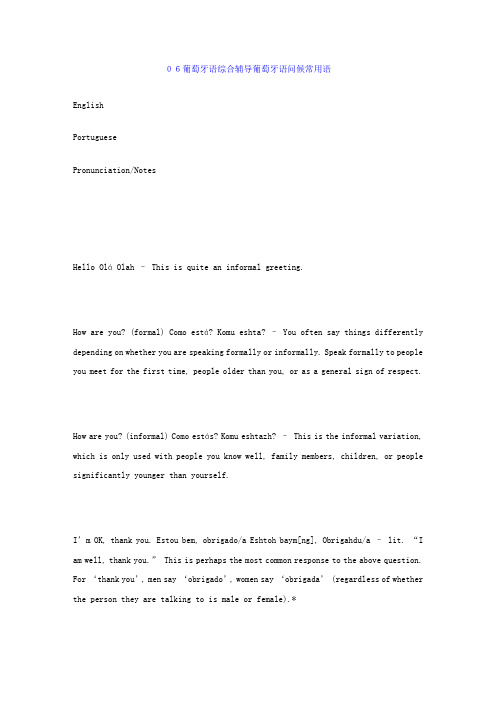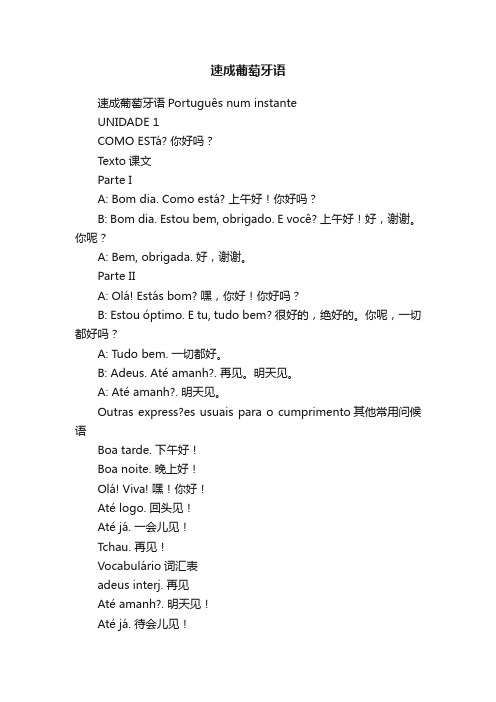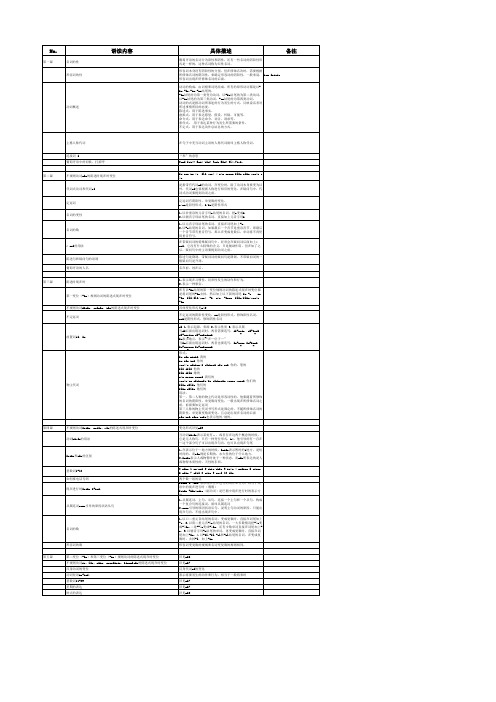速成葡萄牙语第六课
06葡萄牙语综合辅导葡萄牙语问候常用语

06葡萄牙语综合辅导葡萄牙语问候常用语EnglishPortuguesePronunciation/NotesHello Olá Olah – This is quite an informal greeting.How are you? (formal) Como está? Komu eshta? – You often say things differently depending on whether you are speaking formally or informally. Speak formally to people you meet for the first time, people older than you, or as a general sign of respect.How are you? (informal) Como estás? Komu eshtazh? – This is the informal variation, which is only used with people you know well, family members, children, or people significantly younger than yourself.I’m OK, thank you. Estou bem, obrigado/a Eshtoh baym[ng], Obrigahdu/a – lit. “I am well, thank you.” This is perhaps the most common response to the above question. For ‘thank you’, men say ‘obrigado’, women say ‘obrigada’ (regardless of whether the person they are talking to is male or female).*I am fine Estou óptimo/a Eshtoh ohtimu/a – note that the ‘p’ in ‘optimo’ (fine) is virtually silent (the Brazilians spell it without a ‘p’). Again, whether to use ‘optimo’ or ‘optima’ depends on your own gender.Is everything OK? Tudo bem? Toodu baym[ng]? – lit. “everything well?” Note: This is probably the most common greeting in Portuguese - it is used much more frequently than 'como está?'.Yes (everything is ok) Tudo [bem] Toodu – lit. “everything [well].” The ‘bem’is optional when replying to the above question.Not too bad Mais ou menos Myze oh menush – lit. “more or less.” Use this response if you want to indicate that you are a little ‘under the weather’.Pleased to meet you Prazer Prazair – lit. “pleasure.”Very pleased to meet you Muito prazer M[ng]wee[ng]tu Prazair –lit. “much pleasure.” The word ‘muito’ has a very nasal sound, which kind of breaks the rules of pronunciation! Sometimes it can sound more like ‘moitu’, depending on the accent of the speaker.Good Morning Bom dia Bom[ng] deeya – lit. “Good day”– a slightly more formalgreeting than Olá– generally used up until about 1pm.Good Afternoon Boa tarde Boa tarde (after about 1pm)Good Evening Boa noite Boa noite – note that the same word, noite, is used for both evening and night. Switch from saying ‘boa tarde’ to ‘boa noite’ around sunset.Good Night Boa noite Boa noite精品文档资料,适用于企业管理从业者,供大家参考,提高大家的办公效率。
葡语学习速成

汉语
奖励 胶水 搅肉机 教师 姐妹 今天 进 经理 警察 旧的 句子 开始 看 颗粒 空调 空心砖 扣除 快 快点儿 快点儿,过来干活 筷子 宽的 宽度 垃圾 懒惰 厘米 离开 理解 立方米 立刻、马上 立模 料斗 楼层/走 旅行 卵石 轮胎 螺丝 中国人、汉语 中间、一半 中午 住址 注意 注意安全 柱子 祝贺 砖 装(船) 桌子 字典 钻石
1 嗡 2 道义丝 3 的来丝 4 瓜度 5 森古 6 塞一西 7 塞带 8 袄一度 9 闹外 10 带习 11 昂在 12 到在 13 的来在 14 嘎5到了在 15 跟在 16 力日爱赛意思 17 力日爱赛呆 18 力脑一度 19 力日爱脑外 20 温呆 21 温带欧 22 温带道义司 23 温带得来四 24 温带挂的路 25 温带森古 26 温带塞习 27 温带塞带 28 温带袄一度 29 温带闹外 30 的林大 40 挂林大 50 新关大 60 塞僧大 70 塞等大 80 奥一大 90 闹问大 100 渗 200 度任度 300 代来任度 400 瓜度神度 500 给年度 600 塞森读 700 塞待神度 800 袄仪僧度 900 闹外僧度 1000 米粒 (某某人)他去干什么了? 物给爱了是大发字了 安排 奥了干你则了 安排/组织 奥了干你则了
葡萄牙语入门教程

第一课(1)辅音字母的发音与英语单词相比,葡萄牙语单词的发音是比较简单的,除了辅音字母x的发音稍微复杂一些之外,其它辅音、元音字母都有固定的发音,只要我们掌握每个辅音、元音字母的发音,今后看到一个单词,就可以直接拼读出来,而不必像英语那样,必须查阅《英汉词典》,才能知道一个单词的正确发音。
下面是葡萄牙语中辅音字母的发音。
点击[这里],可以下载下表例词的发音文件,用Windows附带的Media Player 即可收听。
请注意:这些例词的发音都是"巴葡"发音,是计算机自动合成的,并不标准,仅供参考。
字母发音(国际音标)发音(汉语拼音)例词b[b]b bala在a/o/u之前发[k]音k casac在e/i之前发[s]音s cedoç[s]s moçach[]sh cheque d[d]d dataf[f]f faca在a/o/u之前发[g]音g gatog在e/i之前发[]音r gelo在a/o之前发[gw]音gu guarda gu在e/i之前发[g]音g guerra gü[gw]gu lingüistah不发音hotelj[]r jornalk葡萄牙语没有这个字母,仅出现在外来语单词中,发[k]音。
l在a/e/i/o/u之前发[l]音l laranja 在a/e/i/o/u之后发[w]音u Brasillh[lj]li trabalho m[m]m mapan[n]n nada nh[nj]ni banho p[p]p patoqu在a/o之前发[gw]音gu quase 在e/i之前发[g]音g aquiqü[gw]gu cinqüent ar[r](短颤音)recibo rr[r](长颤音)carro s在两个元音字母之间发[z]音z casa 在其它位置发[s]音s sopa ss[s]s passo t[t]t tomate v[v]w vaga w葡萄牙语没有这个字母,仅出现在外来语单词中,发[w]音。
速成葡萄牙语

速成葡萄牙语速成葡萄牙语Português num instanteUNIDADE 1COMO ESTá? 你好吗?Texto课文Parte IA: Bom dia. Como está? 上午好!你好吗?B: Bom dia. Estou bem, obrigado. E você? 上午好!好,谢谢。
你呢?A: Bem, obrigada. 好,谢谢。
Parte IIA: Olá! Estás bom? 嘿,你好!你好吗?B: Estou óptimo. E tu, tudo bem? 很好的,绝好的。
你呢,一切都好吗?A: Tudo bem. 一切都好。
B: Adeus. Até amanh?. 再见。
明天见。
A: Até amanh?. 明天见。
Outras express?es usuais para o cumprimento其他常用问候语Boa tarde. 下午好!Boa noite. 晚上好!Olá! Viva! 嘿!你好!Até logo. 回头见!Até já. 一会儿见!Tchau. 再见!Vocabulário词汇表adeus interj. 再见Até amanh?. 明天见!Até já. 待会儿见!Até logo. 回头见!bem adv. 好boa adj. bom的阴性形式Boa noite. 晚上好!Boa tarde. 下午好!bom adj. 好的Bom dia. 上午好!como adv. 如何,怎样Como está? 你好?你好吗?e conj. 和;那么está系动词estar (表示"处于……状态")陈述式现在时第三人称单数的变位形式estás系动词estar陈述式现在时第三人称单数的变位形式Estás bom? 你好?你好吗?estou系动词estar陈述式现在时第一人称单数的变位形式obrigada interj. 谢谢(女性使用)obrigado interj. 谢谢(男性使用)oláinterj. 嘿,你好<可能来源于法语的all?>óptimo adj. 很好的,绝好的tchau interj. 再见<应该是来源于意大利语ciao>tu pron. pess. 你Tudo bem? 你好;一切都好吗?viva你好vocêpron. pess. 你;您语法Gacitamar1.名词的性(género do substantivo) (I)葡萄牙语的名词不像英语那样有可数和不可数之分,但却有阴性(feminino)和阳性(masculino)之别。
葡语十日入门

第一日1.1 葡语字母的发音葡语有26个字母,除了字母x之外,其余25个字母都有固定的发音。
读者只要掌握每个字母的发音,今后看到一个单词,就可以立即拼读出来。
下表是用国际音标标注的葡语字母的发音,其中"巴葡"是指巴西的葡语,"葡葡"是指葡萄牙的葡语。
字母发音例词a [a] mapa [m'apa]b [b] bola [b'ola]c 在a/o/u之前发[k]音casa [k'aza] 在e/i之前发[s]音cedo [s'edu]ç[s] moço [m'osu] ch [ʃ] chave [ʃ'avi]d [d] data [d'ata]di发[dʒi]音(巴葡)或[di]音(葡葡)dica [dʒ'ika]de在词尾发[dʒi]音(巴葡)或[də]音(葡葡)cidade [sid'adʒi]e 在词尾发[i]音(巴葡)或[ə]音(葡葡)nome [n'omi] 在其他位置发[e]音(备注①)medo [m'edu]f [f] faca [f'aka]g 在a/o/u之前发[g]音gato [g'atu] 在e/i之前发[ʒ]音gelo [ʒ'elu]gu 在a/o之前发[gw]音guarda [gw'arda] 在e/i之前发[g]音guerra [g'era]gü[gw] lingüista [lingw'ista]h 不发音hora ['ora]i [i] vida [v'ida]j [ʒ] jogo [ʒ'ogu]k [k] 仅出现在外来语单词中l 在a/e/i/o/u之前发[l]音luta [l'uta] 在a/e/i/o/u之后发[u]音total [tot'au]lh [lj] julho [ʒ'ulju] m [m] mesa [m'eza]n [n] nada [n'ada] nh [nj] banho [b'anju]o 在词尾发[u]音mito [m'itu] 在其他位置发[o]音(备注②)moda [m'oda]p [p] pato [p'atu]qu 在a/o之前发[kw]音quase [kw'azi] 在e/i之前发[k]音aqui [ak'i]qü[kw] seqüente [sekw'entʃi] r [r](备注③)ramo [r'amu]rr [r](备注③)carro [k'aru]s 在a/e/i/o/u之间发[z]音base [b'azi] 在词尾发[s]音(巴葡)或[ʃ]音(葡葡)adeus [ad'eus] 在其他位置发[s]音sopa [s'opa]sc 在e/i之前发[s]音piscina [pis'ina] sç[s] desça [d'esa] ss [s] passo [p'asu]t [t] fato [f'atu] ti发[tʃi]音(巴葡)或[ti]音(葡葡)tipo [tʃ'ipu] te在词尾发[tʃi]音(巴葡)或[tə]音(葡葡)noite [n'oitʃi]u [u] mudo [m'udu]v [v] vago [v'agu]w [w] 仅出现在外来语单词中x 在词首发[ʃ]音xale [ʃ'ali]在其他位置发[ks]音或[s]音或[ʃ]音或[z]音sexo [s'eksu]texto [t'estu]caixa [k'aiʃa]exame [ez'ami]xc 在e/i之前发[s]音exceto [es'etu]y [j] 仅出现在外来语单词中z 在词尾发[s]音(巴葡)或[ʃ]音(葡葡)feliz [fel'is] 在其他位置发[z]音zero [z'eru]备注:① [e]类似汉语拼音的韵母[ei],但发音时间较短。
外语教学和研究出版社速成葡萄牙语词汇表和语法汇总

指示代词
地点副词aqui,ai,ali
颜色的表达 价格的表达 委婉的提出要求,想法
第九课
陈述式简单过去完成时
从属连词que引导的直接宾语从句
关系代词que,onde引导的形容词从句
从属连词poruqe引导的原因状语从句
形容词比较级
não…nada的用法
葡萄牙语的称呼
第七课
不规则动词atrair的陈述式现在时变位 基数词1000-1000000 年份,季节的表达 天气的表达和无人称动词 方向的表达
详见p96 详见p96 详见p97 表示天气等自然现象的动词和表示时间的动词都是无人称动 词,他们都没有主语,一般只用第三人称单数的变位形式。 详见p98 反问疑问句的基本形式有两种, 1.一种是前面是陈述句,后面用逗号隔开,加上não+陈述句 中所使用动词或não e这个结构。不管前面是什么样的动 词,都可以用não e这个结构来反问。 2.前面是个否定句,后面用逗号隔开,再加上pois não这个 结构。 相对最高级指的是形容词所修饰的名词在其同类中达到了相 对最高级的程度,其构成为: o(s)/a(s)mais(menos)+adj. 由于这种结构最高级是相对而言,因此在上述结构中,往往 通过前置词de,entre,em或是de和entre的连写形式dentre 连接一个相比较的东西。 对于某些特殊形式的单词较高级和较低级,他们的相对最高 级将是在他们之前加上定冠词。 quando:当…时候,引导一个时间状语从句 enquanto:与…同时,在…时候,一边…一边…,引导一个 表示两个动作同时发生的时间状语从句。 表示既不…也不…
反问疑问句
形容词相对最高级
从属连词quando,enquanto引导的时间状语从句 não…nem...的使用方法
06葡萄牙语综合辅导自我介绍常用葡萄牙语
06葡萄牙语综合辅导自我介绍常用葡萄牙语EnglishPortuguesePronunciation/NotesMy name is… Chamo-me… Shamu-me…– lit. “I call myself…”O meu nome é… oo mayu nome eh – lit. “the my name is…”What is your name?Como se-chama? Komu se-shama? – lit. "How do you call yourself?"Qual é o seu nome? Kwal eh oo sayu nome? – lit. “What is the your name?”This is…Este é…Eshte eh… (when introducing a male)Esta é… Eshta eh… (when introducing a female)my husband o meu marido oo mayu mareedu – lit. “the my husband”my wife a minha esposa a minya eshpoza – lit. “the my spouse”a minha mulher a minya mulyair – lit. “the my woman”–‘mulher’ is usually used to refer to your own wife, whereas ‘esposa’ can be used for your own, or someone elses wife.my boyfriend o meu namorado oo mayu namorahdu – lit. “the my boyfriend”my girlfriend a minha namorada a minya namorahda – lit. “the my girlfriend”–when used by a male referring to his female partnera minha amiga a minya ameega – lit. “the my friend”– when used by a female referring to a female frienda friend um amigo oom[ng] ameegu – a male frienduma amiga oom[ng]a ameega – a female friendDo you speak English? Fala Inglês? Fahla Ingle[a]ysh? – Although the ‘ê’ sometimes sounds more open (‘ay’), the circumflex still denotes that it should be a close pronunciation. Listen carefully to a native speaker – the sound is like a cross between the ‘ea’ of ‘ear’ and the ‘ai’ of ‘air’. The same is true of the words‘Inglesa’; ‘Português’; and ‘Portuguesa’.I am learning to speak Portuguese Eu aprendo a falar Português Ayoo aprendu a falar Portooge[a]yshI am English Sou Inglês Soh Ingle[a]ysh – only said by malesSou Inglesa Soh Ingle[a]yza – only said by femalesI am Portuguese Sou Português Soh Portooge[a]ysh – only said by malesSou Portuguesa Soh Portooge[a]yza – only said by femalesI am from England Sou da Inglaterra Soh da Inglaterrrra – lit. “I am from the England”I am from Portugal Sou de Portugal Soh de Portugal – they don’t say ‘from the Portugal’ (like they do with England), just ‘from Portugal’ (like we do). Most other countries of the world require ‘from the’ (‘do’ or ‘da’ depending on the gender of the country – see section on nouns below)Where are you from? De onde é? Di-yondi-yeh?in England na Inglaterra na Inglaterrrra – lit. “in the England”in Portugal em Portugal aym[ng] PortugalI am from London Sou de Londres Soh de LondreshSorry! Desculpe! Deshculpe!I am sorry Lamento Lamentu – lit. “I lament”.Pe?o desculpas Pessu Deshculpash – lit. “I ask for excuses”.Excuse me Com licen?a Com[ng] lissensa – lit. “with permission”.I don't understand n?o entendo now[ng] entendu – lit. “not I understand”.so then ent?o entow[ng] – lit. “then”, but used frequently in places where English would say 'so', or 'right then'.you (singlular) você vosseh – A formal way of addressing someone (in Brazil they use você informally as well).o senhor oo senyor – lit. “the gentleman”a senhora a senyora – lit. “the lady”Note, the Portuguese generally speak more formally than the English, so although referring to someone as 'the lady' or 'the gentleman' would sound rather pompous to us, it is quite common in Portuguese. Senhor/Senhora can also mean sir/madam, Mr/Mrs (‘Miss’ would be ‘a menina’, or ‘Senhorita’), or Lord/Lady.I eu ayuhe ele ele - the first 'e' is very close, almost like an English 'i', whereas the second 'e' is barely audible (so it sounds almost like you are saying 'ill').she ela ela'Com licen?a' is often said as a parting formality – for example, as a polite way to end a telephone conversation. The word 'ent?o' is a very useful word for linking to a new subject without appearing too abrupt精品文档资料,适用于企业管理从业者,供大家参考,提高大家的办公效率。
葡语速成对话(含重点语法)
葡萄牙语速成对话语法:1.主格人称代词:eu我nós我们;você你vocês你们;ele,ela 他,她,它eles,elas 他们,她们,它们。
物主代词:我(们)的meu/minha;nosso/nossa;你(们)的seu/sua, vosso/vossa; 他、她(们)的dele/dela, deles/delas2.连接词e—和;那么(那么)。
3. 系动词Ser,可变为:第一人称sou,somos(复数);其余人称é,são(复数)4. 反身代词eu→me, tu→te,(ele,ela,você,o senhor, a senhora)→se, nós→nos,(eles,elas, vocês, os senhores, as senhoras) →se。
如chamar-se第一人称chamo-me,第三人称chama-se5.定冠词:0/0s (阳),a/as(阴);不定冠词---um,uma6.前置词 De表示起源Sou de Pequim. 我是北京人;表示性质tradutor de ingles 英语翻译;表示从属O livro é do professor这本书是老师的。
当de后面出现冠词时,要连写:de+0(s)=do(s) de+a(s)=da(s) de+um=dum de+uma=duma7.前置词em表示地点,“在,位于…”;相当于英语in/on当em后面出现冠词时,要连写:em+o(s)=no(s) em+a(s)=na(s) em+um=num em+uma=numa前置词a表示方向,不译;表示目的,不译;表示对象,不译。
表示时间,“在…点钟”,这时可与定冠词一起连写为ao,as,á,ás;与“星期几”连,“每周几”。
前置词para表示方向与目的,译“去”;até“到,直到,until”8. Há(haver的变位):有…;存在…三个不规则动词陈述式现在时变位Estar(to be在…地方;某种状态):estou, estás,está,estamos, estãoPoder(can,may):posso, podes, pode, podemos, podemVer(see): vejo, vês, vê, vemos, vêem9. 时态1)现在进行时 es tar a +inf. Eles estão a ver televisão.他们在看电视。
快速入门葡萄牙语
快速入门葡萄牙语葡萄牙语,作为世界上常用的语言之一,具有着广泛的应用领域和丰富的文化内涵。
无论是为了旅行、学习或工作,掌握一些葡萄牙语基本表达能力都会给我们带来很多便利。
那么,如何快速入门葡萄牙语呢?下面让我们一起来看看。
首先,对于初学者来说,了解葡萄牙语的基本特点是非常重要的。
葡萄牙语属于拉丁语系,和西班牙语、意大利语等语言有着相似的词汇和语法结构。
因此,如果你已经掌握了其中一种语言,学习葡萄牙语将会事半功倍。
同时,葡萄牙语的发音相对来说比较困难,存在一些特殊的音。
因此,正确的发音是学习葡萄牙语的关键之一。
其次,建立一个扎实的语法基础是掌握葡萄牙语的关键。
葡萄牙语的语法相对来说相对简单,但也存在一些特殊的规则和用法。
掌握基本的词汇、动词的变位规则以及句子结构是我们学习葡萄牙语的第一步。
可以通过参加语言课程、自学书籍、在线学习资源等多种方式来学习和掌握这些基础知识。
同时,多做听力和口语练习也是提高葡萄牙语能力的重要方法。
当我们学习一门语言时,只有通过大量听取和模仿,才能真正掌握语言的自然表达方式。
可以通过听取葡萄牙语音频、观看葡萄牙语电影、和母语人士进行对话等方式来提高听力和口语能力。
同时,尝试用葡萄牙语进行日常交流,积极参与语言环境,也是提高口语表达能力的有效途径。
此外,要学会利用各种资源和工具来辅助学习葡萄牙语。
比如,可以下载各种葡萄牙语学习的手机应用程序,通过这些应用程序不仅可以进行单词和语法的学习,还可以进行听力和口语的练习。
此外,可以利用互联网上丰富的葡萄牙语学习资源,如在线课程、语言交流平台等,来帮助我们提高语言能力。
这些资源对于那些不能参加正式语言课程的人来说尤为有用。
最后,跳出舒适区,积极实践是学习葡萄牙语的关键。
尽管初学者可能会感到难度重重,但只有通过不断的练习和实践,才能真正将所学的知识应用于实际生活中。
可以通过与其他葡萄牙语学习者组成学习小组,每周举行一次语言交流会,进行互相练习和提高。
葡萄牙语学习
葡萄牙语常用的三个介词a/de/em是葡萄牙语中最常用的三个介词,下面依次介绍它们的含义与用法。
①a:表示方向,一般译为"到"。
a Beijing(到北京)②de:有两个意思。
第一个意思表示所有,一般译为"的"。
o carro de Jo鉶(若昂的汽车。
若昂是常见的葡萄牙男人名字,相当于英语的约翰)第二个意思表示起点,一般译为"从"。
Eu sou de China.(我从中国来,也就是我来自中国)③em:表示地点,一般译为"在"。
Eu estou em Portugal.(我[临时]在葡萄牙)葡萄牙语综合辅导:时间的表达Weekdays times of dayem português in Englishdomingo msegunda-feira fterça-feira fquarta-feira fquinta-feira fsexta-feira fsábado m SundayMondayTuesdayWednesdayThursdayFridaySaturdaymanhã fdia mnoite ftarde f morningdayevening, nightevening before six o'clockde manhãde /à noitede dia in the morningat night/in the eveningin the dayBom dia!Boa tarde!Boa noite! Good morning!Good afternoon!Good evening/night!The "-feira" ending can be left out (quinta-feira >> quinta).Monthsem português in English1. janeiro m2. fevereiro m3. março m4. abril m JanuaryFebruaryMarchApril5. maio m6. junho m7. julho m8. agosto m MayJuneJulyAugust9. setembro m10. outubro m11. novembro m12. dezembro m SeptemberOctoberNovemberDecemberIn European Portuguese months are written with capital first letterSeasonsem português in Englishprimavera fverão moutono minverno m springsummerautumn, fallwinterIn European Portuguese seasons are written with capital first letterDatesDates are written like this:21 de novembro de 1997葡萄牙语综合辅导:钟点的表达Que horas são, por favor? What time is it ?Full Hoursem português in EnglishÉ meio-dia. It is midday.É meia-noite. It is midnight.É uma hora. It is 1 o'clock.São duas horas. It is 2 o'clock.São três horas. It is 3 o'clock.(etc)São dez horas. It is 10 o'clock.São onze horas. It is 11 o'clock.São doze horas. It is 12 o'clock.São oito horas da manhã. It is 8 o'clock in the morning.É uma hora da tarde. It is 1 o'clock in the afternoon.São oito horas da noite. It is 8 o'clock in the evening.É uma hora da manhã . It is 1 o'clock in the morning .É and são are 3rd person singular and plural forms of verb SER .meio/a half, middledia m daynoite f nightmanhã f morningtarde f afternoonhora f hourQuarters half06葡萄牙语综合辅导葡萄牙语观光与旅游----在哪里?= Ondeé ...? Onde está ...?车费多少钱?= Quantoé que custa o bilhete?票= Bilhete一张去----的票= Um bilhete para ..., por favor.你去哪里?= Para ondeé que vai?火车= Comboio公共汽车= Autocarro地铁= Metro飞机场= Aeroporto火车站= Estação de caminho de ferro公共汽车站= Estação rodoviária地铁站= Estação de metro出境= Partida入境= Chegada汽车租赁处= Agência de aluguer de carros停车场=Estacionamento旅馆= Hotel客房= Quarto预订= Reserva今晚有没有空房= Há vagas para hojeà noite?客满= Não há vagas护照= Passaporte葡萄牙语综合辅导葡萄牙语时间与日期的表达一月 = Janeiro二月= Fevereiro三月= Março四月= Abril五月 = Maio六月 = Junho七月 = Julho八月 = Agosto九月= Setembro十月 = Outubro十一月 = Novembro十二月 = Dezembr o春天= Primavera夏天 = Verão秋天= Outono冬天= Inverno今天 = Hoje昨天 = Ontem明天 = Amanhã生日= Aniversário, Dia de Anos, Anos祝你生日快乐= Feliz Aniversário! Parabéns!http:/ /葡萄牙语综合辅导:国家与民族Continentsem português adjective, noun in EnglishEuropa*norte da Europasul da Europaeuropeu/péianorte europeu/péiasul europeu/péiaEuropeNorth EuropeSouth EuropeAmérica do Norte*América do Sul*norte americano/asul americano/aNorth A mericaSouth AmericaÁfrica*África do norteÁfrica do sulafricano/anorte africano/asul africano/aAfricaNorth AfricaSouth AfricaÁsia*o Extremo Orienteo Oriente Médioo Oriente Próximoasiático/a AsiaFar EastMiddle EastNear EastAustrália*australiano/aAustraliaAntártica*adj: antárticonoun: o AntárticoAntarcticanoun: The Antactica* These are the "actual" continents, rest of the names are regularly used in every day language. Examples:Eu sou europeu I am EuropeanEu sou da Europa I am from EuropeV ocêé sul americano ? Are you South American ?Scandinaviain English em portuguêsDenmark(adj, noun: masculine) (adj, noun: feminine)DinamarcadinamarquêsdinamarquesaFinlandFinlândiafinlandêsfinlandesaIcelandIslândiaislandêsislandesaNorwayNorueganorueguêsnorueguesaSwedenSuéciasuecosuecaEuropein English em portuguêsPortugal(adj, noun: masculine) (adj, noun: feminine)PortugalportuguêsportuguesaEnglandInglaterrainglêsinglesaSpainEspanhaespanholespanholaFranceFrançafrancêsfrancesaGermanyAlemanhaalemãoalemãItalyItáliaitalianoitaliana葡萄牙语第一次见面常用语V ocê fala português?你说葡萄牙语吗?Falo我说N?o,n?o falo.不,我不说Falo um pouco.我说一点。
- 1、下载文档前请自行甄别文档内容的完整性,平台不提供额外的编辑、内容补充、找答案等附加服务。
- 2、"仅部分预览"的文档,不可在线预览部分如存在完整性等问题,可反馈申请退款(可完整预览的文档不适用该条件!)。
- 3、如文档侵犯您的权益,请联系客服反馈,我们会尽快为您处理(人工客服工作时间:9:00-18:30)。
UNIDADE 6COMO É ELE?他是什么样的?Texto 课文Parte IA: Quantos anos tem?你多大?B: Tenho 25 anos.二十五岁A: É casado ou solteiro?已婚还是未婚B: Sou solteiro.未婚Parte IIAna: Que idade é que ele tem?他多大Ema: Não sei bem. Penso que tem 36.我不是很清楚,我想是三十六岁吧。
Ana: Como é ele?他怎么样Ema: É baixo, gordo e feio.矮矮的,胖胖的,很难看。
Ana: Mas é simpático?不过人还不错吧?Ema: Não, é muito antipático.不。
很不招人喜欢Parte IIIA: Achas que a Sofia é bonita?你觉得索菲亚漂亮吗?B: Sim. Mas acho que a Emília é ainda mais bonita.挺漂亮的,不过我觉得艾米利亚还要更漂亮些。
Parte IVAlguém toca à campainha. O David abre a porta. É o dono da casa, o Eng.o Mário Pereira. Hoje édia 30, é o dia de pagamento do aluguel. Na verdade, no Brasil o aluguel não é nada barato. O Ma e os seus amigos têm que pagar cada um R$450 (quatrocentos e cinquenta reais) por mês.有人摁门铃,大卫打开门,是房东马里奥-佩雷拉工程师。
今天是三十号,是叫房租的日子。
事实上巴西的房子一点儿也不便宜,马和他的朋友们每人每月需交450雷亚尔。
O Eng.o Mário é de meia idade. Tem 46 anos e é uma pessoa simpática. Ele é engenheiro civil e trabalha numa empresa de construção civil. É moreno, alto e forte. É casado com a Dr. a Ângela Rossi, que é psicóloga. Ela tem 42 anos. É loira, magra e muito bonita.马里奥工程师是位中年人。
他今年46岁。
人很和气,他是土木工程师,他在一家建筑公司工作。
他皮肤黝黑,高大健壮,他的夫人是心理学家安吉拉-罗西女士,她四十二岁,金发碧眼,瘦瘦的,很漂亮。
O casal tem dois filhos: uma filha e um filho. A filha, a Emília, tem 19 anos e também é muito bonita, talvez até mais bonita do que a mãe. Ela estuda Medicina na Universidade Federativa do Rio de Janeiro, porque quer ser dentista. Ela é muito estudiosa e é boa aluna.他们有两个孩子,一女孩,一男孩。
女孩叫艾米利亚。
今年十九岁,她也很漂亮,甚至比她妈妈还漂亮。
她在里约热内卢联邦大学学医,因为她想当牙医。
她很用功,学习成绩良好。
O filho, o Lúcio, tem 15 anos e anda na escola secundária. Ele éinteligente, mas não étão estudioso como a irmã. Gosta mais de futebol e já joga muito bem.男孩叫卢西奥,今年十五岁,他在上中学,他很聪明,但不像他姐姐那样好学。
他更喜欢足球,而且已经踢得不错了。
Vocabulário 词汇表ainda adv. 仍然,还;甚至,还要(与比较级连用)alguém pron. indef. 某人alto adj. 高的aluguel (br.) (巴)房租,租金aluguer (port.) m. (葡)房租,租金aluno m. 学生ano m. 年;岁antipático adj. 不亲切的,不友善的,不和善的atéadv. 甚至baixo adj. 矮的;低的barato adj. 便宜的bonito adj. 美的,漂亮的cada pron. indef. 每,每个campainha f. 门铃casado adj. 结婚的,已婚的casal m. 夫妇,夫妻civil adj. 民用的,民事的como conj. 如同,像construção f. 建筑;建筑学;建设~ civil f. 土木建筑de meia idade loco adj. 中年的dentista s.2 g. 牙医dono da casa (br.) m. (巴)房东engenheiro civil m. 土木工程师escola secundária 中学estudioso adj. 用功的,好学的estúpido adj. 笨的,愚蠢的federativo adj. 联邦的feio adj. 丑的,难看的forte adj. 强壮的fraco adj. 弱的,瘦弱的futebol m. 足球运动gordo adj. 胖的,肥的idade f. 年龄inteligente adj. 聪明的jáadv. 已经loiro adj. 金发碧眼的magro adj. 瘦的mais adv. 更,更加mas conj. 但,但是,可是medicina f. 医学menos adv. 表示低一级,小一级(一般用于较低比较级)mês m. 月moreno adj. 皮肤黝黑的;黑发的(指白种人或其他非黑种人) na verdade loco adv. 事实上nada adv. 绝不,一点儿也不pron. indef. 没有任何东西(用于否定旬);一些东西(用于疑问句) pagamento m. 支付,付款pessoa f. 人por prep. 每porque conj. 因为porta f. 门preguiçoso adj. 懒的,懒惰的psicólogo m. 心理学家senhorio (port.) m. (葡)房东simpático adj. 亲切的,和气的,和善的,友善的solteiro adj. 单身的,未婚的talvez adv. 也许,可能tão adv. 如此trabalhador adj. 勤奋的,努力的;勤快的Verbosabrir v. tr. 开,打开achar v. tr. 认为,以为andar v. intr. (em)上(学)dizer v. tr. 说,讲gostar v. intr. (de)喜欢jogar v. tr. 打、踢(球类运动),下(棋),打(牌),玩儿(游戏)pagar v. tr. 付(款)pensar v. tr. 想,认为perguntar v. tr. 问saber v. tr. 知道ter que / ter de 必须,不得不,一定tocar v. intr. 触,触摸Informações suplementares 补充信息As moedas 部分国家和地区的货币euro 欧元real 雷亚尔(巴西)kwanza 宽扎(安哥拉) metical 梅蒂卡尔(莫桑比克)yuan 元(人民币) pataca 澳门元dólar 美元libra 英镑HK dólar 港币iene 日元语法(Gramática)1.不规则动词dizer、saber的陈述式现在时变位dizer:digo,dizes,diz,dizemos,dizemsaber:sei,sabes,sabe,sabemos,sabem其实,在陈述式现在时中,saber只有第一人称单数的变位是不规则的,而dizer的变位规则与fazer 相似。
2.基数词30—90030 trinta 200 duzentos/as40 quarenta 300 trezentos/as50 cinquenta 400 quatrocentos/as60 sessenta 500 quinhentos/as70 setenta 600 seiscentos/as80 oitenta 700 setecentos/as90 noventa 800 oitocentos/as100 cem 900 novecentos/as101 cento e um/uma110 cento e dez121 cento e vinte e um/uma注意:1)单说100是cem,但在100以上、200以内的数字中所含的“100”这个概念则要说cento。
而且,在百位数、十位数和个位数之间要用e连接。
如:108:cento e oito115:cento e quinze145:cento e quarenta e cinco2)200—900永远以复数形式出现,而且,有阴阳性的变化。
其阴阳性随后面所跟名词而变。
如:200个男人duzentos homens200个女人duzentas mulheres550本书quinhentos e cinquenta livros550支笔quinhentas e cinquenta canetas3.月份、日期的表达1)月份-Em que mês estamos?现在几月?-Estamos em Abril.现在是四月。
